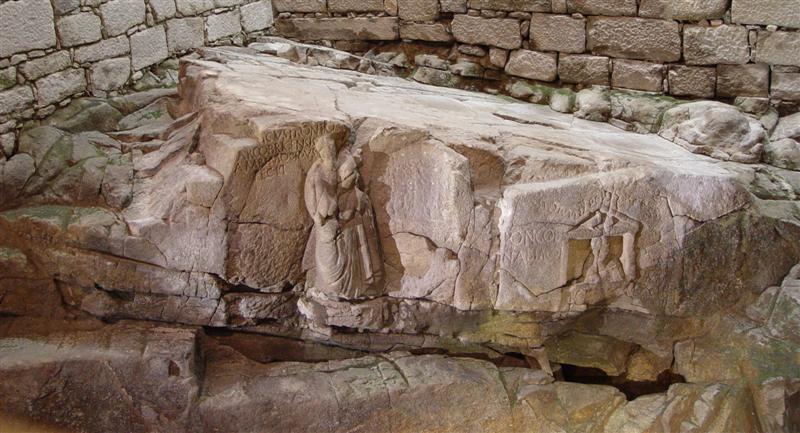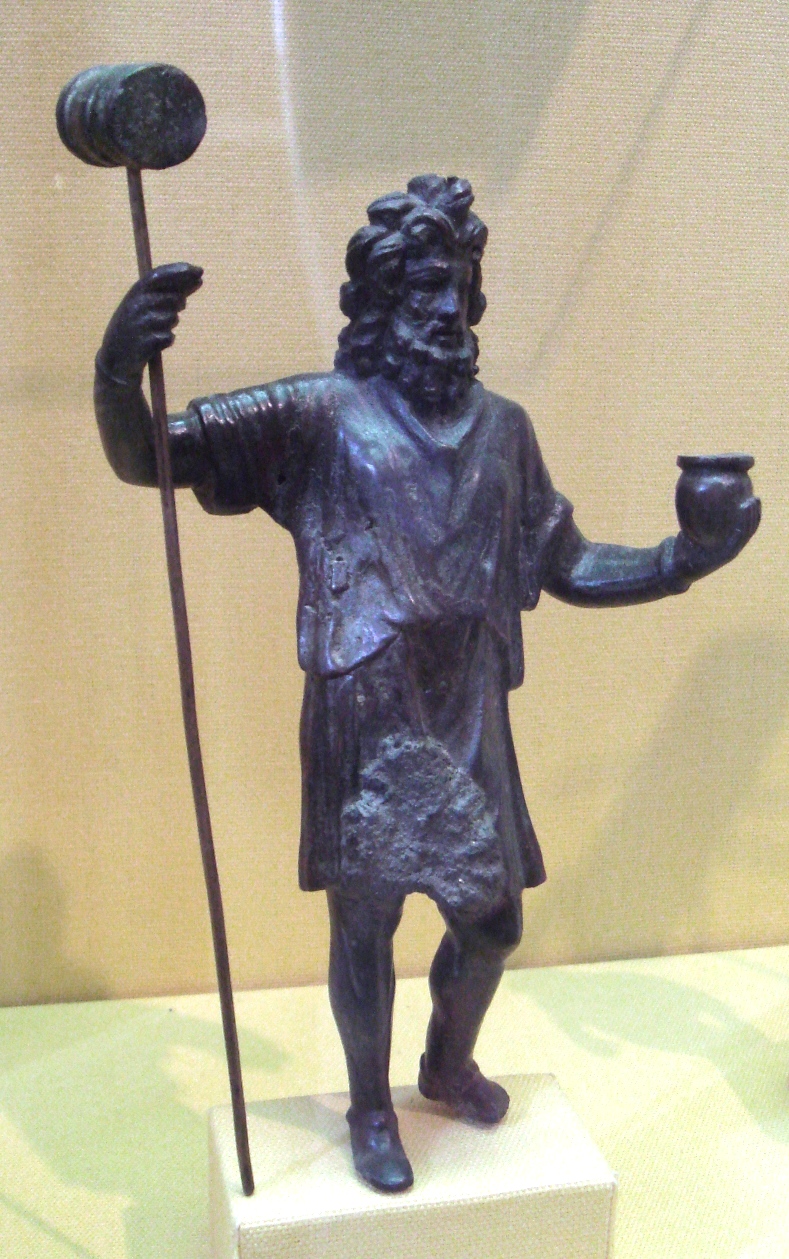The Lusitanians worshipped various gods in a very diverse polytheism, using animal sacrifice. They represented their gods and warriors in rudimentary sculpture. Endovelicus was the most important god: his cult eventually spread across the Iberian peninsula and beyond, to the rest of the Roman Empire and his cult maintained until the 5th century; he was the god of public health and safety. The goddess Ataegina was especially popular in the south; as the goddess of rebirth (Spring), fertility, nature, and cure, she was identified with Proserpina during the Roman era. Lusitanian mythology was related to Celtic mythology, and during later Roman rule it also became heavily influenced by Roman mythology, as Romans also started venerating Lusitanian gods. Runesocesius, the javelin god, was also an important god, and often formed the supreme trinity in the Lusitanian pagan religion with Endovelicus and Ataegina.
The Lusitanians practiced the cult of the dead, and used cremation.
Of particular importance and popularity, especially following the Roman conquest, were a number of deities among whom were Endovelicus, Ataegina, Nabia and Trebaruna. Endovelicus was a god of healing and also had oracular functions. With ninety-four separate dedications,[1] he appears to have been the most important of all. Ataegina is less well defined; her name has been derived from Celtic *atte-gena perhaps meaning "reborn". Nabia may have been two separate deities, the consort of the Lusitanian equivalent of the Roman Jupiter and another associated with earth and sacred springs while Trebaruna's name appears in inscriptions in the Lusitanian language associated with another, presumably male deity named Reve, whom Witczak suggests may be the equivalent of the Roman Iovis or Jupiter, both names ultimately deriving from Proto-Indo-European *diewo-.
Lusitanian Gods:
A
Abna
Aernus
Aetio
Albucelainco
Ambieicris
Arabo
Aracus
Arentia
Arentio
Ares Lusitani
Ataegina
B
Bandua
Bormanicus (Borvo)
C
Cabuniaegenis
Candeberonio
Cariocecus
Carneus
Cauleces
Collouesei
Coronus
Coruae
Coso
D
Debaroni Muceaigaego
Dercetius
Duberdicus
Durius
E
Endovelicus
Edovio
Eniragillo
Epona
Erbina
F
Frovida
I
Igaedo
Ilurbeda
L
Laepo
Laho
Laneana
Laraucus
Lucubo
Lurunis
M
Miraro Samaco
Moelio
Moricilo
Munidis
N
Nabia
Netaci
Neto
O
Ocaere
Q
Quangeio
R
Reo
Reue
Runesocesius
S
Sucellus
Sulae Nantugaicae
T
Tameobrigus
Toga
Tongoe
Tongoenabiagus
Torolo Gombiciego
Trebaruna
Turiacus
Trebopala
V
Verore
Vestio Alonieco
and about my Goddess Ataecina:

Ataegina was worshiped in Lusitania and Betica; there were also sanctuaries dedicated to Ataegina in Elvas (Portugal), and Mérida and Cáceres in Spain, along with other places, especially near the Guadiana river. She was one of the goddesses worshiped in Myrtilis (today's Mértola, Portugal), Pax Julia (Beja, Portugal) and especially the city of Turobriga, whose precise location is unknown. A bronze plaque from Malpartida de Cáceres suggests associations with the goat as a sacred animal.
The name Ataegina is most commonly derived from a Celtic source: the two roots *atte- and *geno- to mean "Reborn" or from *ad-akwī- (Irish adaig) meaning "night", Epigraphs from the Badajoz region associate the goddess with the Roman Proserpina or Persephone which would make her a goddess presiding over Spring and seasonality, echoing the "reborn" derivation of the name.
and my Godess Nabia:

Nabia was the goddess of rivers and water in Gallaecian and Lusitanian mythology, in the territory of modern Galicia (Spain) and Portugal.
The present-day Navia River and Avia_(river) in Galicia, was named in honor of the deity. Likewise, the Neiva River, near Braga (Bracara Augusta, old Roman capital of Gallaecia) and Nabão River who passes through the city of Tomar are also named after her.
The goddess Nabia was very popular in the territory of the Callaici Bracari with several inscriptions, like the one in a Celtic language at Braga's Fonte do Ídolo (Portuguese for Fountain of the Idol)
Sucellus:


Sucellus or Sucellos was the god of agriculture, forests and alcoholic drinks of the Gauls, also part of the Lusitanian mythology. Sucellus may also have been thought of as a creator god...




No comments:
Post a Comment